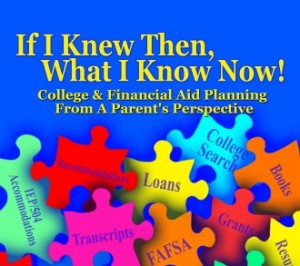6 January 2010 archive
Don’t Wait – It May Be Too Late! 0
 It used to be January, but now it can be as early as October of the senior year when  thousands of families will be filing the FAFSA, Profile and/or Institutional financial aid forms. Many will be waiting for several months before they know if any of the colleges their child has applied to will be affordable. Even if college is more than five years away, a ‘heart attack prevention’ a Dry Run exercise is always a smart idea; even for those parents who believe that money is no object. The parent’s cry for help below is not unusual. However, it can be avoided when someone who is familiar with the individual college financial aid methods used by a wide range of colleges, gives you a realistic view of your family’s future Expected Family Contribution (FM & IM EFC). A projection that is based on the often complex methodologies colleges use to determine need.
It used to be January, but now it can be as early as October of the senior year when  thousands of families will be filing the FAFSA, Profile and/or Institutional financial aid forms. Many will be waiting for several months before they know if any of the colleges their child has applied to will be affordable. Even if college is more than five years away, a ‘heart attack prevention’ a Dry Run exercise is always a smart idea; even for those parents who believe that money is no object. The parent’s cry for help below is not unusual. However, it can be avoided when someone who is familiar with the individual college financial aid methods used by a wide range of colleges, gives you a realistic view of your family’s future Expected Family Contribution (FM & IM EFC). A projection that is based on the often complex methodologies colleges use to determine need.
The earlier the better
Please read this exchange carefully between a disappointed parent and a US News expert:
Question:
My son has recently been accepted to his first choice college, Lehigh University. They have provided him with loans and grants that equal approximately $28,000. The COA is $69,425 a year. My wife and I do not have available funds to make up the difference. What methods can be suggested to give my son the opportunity to attend this school? In high school he has maintained a high academic level, and ranking of 27/499.
Answer:
I hope you have been successful in exploring your financing options. If you haven’t already considered it, a private (non-federal student loan is another option. Many lenders offer non-federal student loans, in which the parent acts as the co-signer. Look for features such as a co-signer release once the student establishes a good repayment record, or reduced interest rates for automatic payments from a bank account. Ask Lehigh if they have any recommendations.
Best wishes to you.
Verna Hazen, U.S. News Expert
____________________
 How much is free advice worth? In this case . . . not much. Too little, too late is my first thought; what is yours? Why didn’t he find out that this would be his probable outcome earlier?
How much is free advice worth? In this case . . . not much. Too little, too late is my first thought; what is yours? Why didn’t he find out that this would be his probable outcome earlier?
